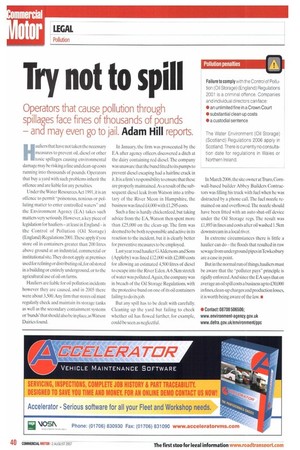Try not to spill
Page 40

If you've noticed an error in this article please click here to report it so we can fix it.
Operators that cause pollution through spillages face fines of thousands of pounds
— and may even go to jail. Adam Hill reports.
Hauliers that have not taken the necessary measures to prevent oil, diesel or other toxic spillages causing environmental damage may be risking a fine and clean-up costs running into thousands of pounds. Operators that buy a yard with such problems inherit the offence and are liable for any penalties.
Under the Water Resources Act 1991, it is an offence to permit "poisonous, noxious or polluting matter to enter controlled waters" and the Environment Agency (EA) takes such matters very seriously. However, a key piece of legislation for hauliers— at least in England — is the Control of Pollution (Oil Storage ) (England) Regulations 2001.These apply if you store oil in containers greater than 200 litres above ground at an industrial, commercial or institutional site.They do not apply at premises used for refining or distributing oil,for oil stored in a building or entirely underground, or to the agricultural use of oil on farms.
Hauliers are liable for oil pollution incidents however they are caused, and in 2005 there were about 3,500. Any firm that stores oil must regularly check and maintain its storage tanks as well as the secondary containment systems or 'kinds' that should also be in place,as Watson Dairies found. In January, the firm was prosecuted by the EA after agency officers discovered a ditch at the dairy containing red diesel. The company was unaware that the bund fitted to its pumps to prevent diesel escaping had a hairline crack in it. It is a firm's responsibility to ensure that these are properly maintained.As a result of the subsequent diesel leak from Watson into a tributary of the River Meon in Hampshire, the business was fined £4,000 with £1,295 costs„ Such a fine is hardly chickenfeed, but taking advice from the EA, Watson then spent more than £25,000 on the clean-up. The firm was deemed to be both responsible and active in its reaction to the incident, but it is clearly better for preventive measures to be employed.
Last year road haulier G Aldersons and Sons (Appleby) was fined £12,000 with £2,000 costs for allowing an estimated 4,500 litres of diesel to escape into the River Eden. A 6.5km stretch of water was polluted. Again, the company was in breach of the Oil Storage Regulations, with the protective bund on one of its oil containers failing to do its job.
But any spill has to be dealt with carefully. Cleaning up the yard but failing to check whether oil has flowed further, for example, could be seen as neglectful. In March 2006, the site owner at Truro, Cornwall-based builder Abbey Builders Contractors was filling his truck with fuel when he was distracted by a phone call, The fuel nozzle remained on and overflowed. The nozzle should have been fitted with an auto shut-off device under the Oil Storage regs. The result was £1.893 in fines and costs after oil washed 1.5km downstream in a local river.
In extreme circumstances there is little a haulier can do — the floods that resulted in raw sewage from underground pipes inTewkesbury are a case in point.
But in the normal run of things, hauliers must be aware that the "polluter pays" principle is rigidly enforeed.And since the EA says that on average an oil spill costs a business up to £30,000 in fines, clean-up charges and production losses, it is worth being aware of the law. •






























































































































































































